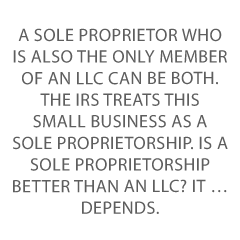Comparing a sole proprietor vs LLC vs S Corp, which will serve your small business the best?
Is it possible to have more than one? What if you choose badly, and want to change?
Check out our pros and cons to help you make the best decision for your small business.
What is a Sole Proprietor?
The most accurate place to determine this is the IRS website.
A sole proprietor is a person who owns an unincorporated business by themself. A company with more than one small business owner cannot, by definition, be a sole proprietorship.
A sole proprietorship may be liable for taxes such as:
- Income tax
- Estimated tax
- Social Security and Medicare taxes and income tax withholding
- Federal unemployment (FUTA) tax
- Excise taxes
A sole proprietorship must also file informational returns on payments to non-employees and transactions with other persons.
It is easy to become one. A business owner does not have to file any forms just to be one. A business which starts out as a side hustle can easily become a sole proprietorship.
Such a company, like corporations and LLCs, must choose a name, register with the Secretary of State’s office, get an EIN and a business bank account, and purchase insurance.
A sole proprietor who is also the only member of an LLC can be both. The IRS treats this small business as a sole proprietorship. Is a sole proprietorship better than an LLC? It … depends.
Let’s look at the differences and pros and cons between a sole proprietorship vs LLC.
Sole Proprietor Pros
Let’s look at the positives.
Easy Business Formation
A business owner does not have to do anything to create a sole proprietorship. It is the default structure of a business. Many people with side hustles may not even realize they own a sole proprietorship.
This cuts costs as some filings for S corporations and LLCs are unnecessary.
An Owner Can Deduct Business Expenses from a Personal Income Tax Return
Since the owner and the sole proprietor are considered to be the same entity, any incurred business expenses are considered by the Internal Revenue Service to be incurred by the owner.
This means that these expenses are deductible on the small business owner’s personal income tax returns.
No Need to File a Separate Tax Return for the Business
A sole proprietorship is not a business entity separate from its owner. Therefore, it does not have to file its own tax returns.
Instead, any income generated by the small business is added to the other income on the owner’s tax returns. The owner must report any profits or losses on their personal tax return.
Sole Proprietor Cons
What are the negatives?
No Protection Against Liability
Since there is no separate legal entity, the solitary owner will end up being liable for anything their small business does.
As a result, liability insurance is a necessity for sole proprietors. If licensing is re quired in a sole proprietor’s industry (by the state, city, or county government), then licensing is also a necessity.
Self-Employment Tax Rates are High
A self employment tax is made up of a 12.4% Social Security tax on income up to an annual income ceiling, and a 2.9% Medicare tax not subject to any ceiling.
Self-employment taxes are the same as the total FICA and Medicare tax paid for an employee.
It Does Not Survive Its Owner
A sole proprietorship’s existence is terminated if its owner decides to go out of business. It is also terminated if the business owner dies.
It is possible to inherit a sole proprietorship. A sole proprietor’s will can pass the business onto a certain beneficiary, but that creates a new sole proprietorship.
And there’s one more negative—because it’s not a separate entity, you cannot build business credit as a sole proprietor.
What is an LLC?
Also called a Limited Liability Corporation, an LLC is a business structure allowed by state statute. Each state may use different regulations. Owners should check with their state for the specifics.
An LLC owner is called a member. Most states do not restrict ownership. Therefore, members can include individuals, corporations, other LLCs, and foreign entities. There is no maximum number of members.
Most states also allow for a single member LLC with just one owner.
The IRS treats LLCs in various ways, depending on how many members there are, and certain elections made by the LLC. The IRS can treat an LLC as a corporation, general partnership, limited partnership or as part of the LLC’s owner’s tax return (a “disregarded entity”).
A domestic LLC with at least two members gets a tax classification of partnership for federal income tax purposes. But if a small business files Form 8832 and affirmatively elects to be treated as a corporation, then the IRS will treat the LLC like a corporation.
An LLC with one member can file Form 8832 and be treated as a corporation. If they do not, then that LLC will be treated as a business entity disregarded as separate from its owner.
If an LLC is also incorporated (and it’s not just being treated as a corporation for business tax purposes), it can build business credit. Otherwise, it’s not separate from its owner(s) and, therefore, cannot.
Pros of an LLC
Consider the positives.
No Restriction on the Number of Members
If circumstances change, and you end up with 101 members of an S corporation, it has to become a C corp. But there’s no such issue with an LLC. As a result, an LLC can grow as your profits grow—and you won’t need to file for something new.
Offers Some Liability Protection
No business structure will completely protect its ownership from every legal eventuality. But a limited liability company offers some liability protection.
The individual assets of an LLC member cannot be used to satisfy the LLC’s business debt or obligations. A member’s risk of loss is limited to how much they invested in the business. But this is only a limited liability.
More Flexible in Ownership and Profit Distribution
Rather than being run by members, an LLC—via operating agreement and/or articles of organization—can provide that it will instead be controlled by managers. Managers can be members or non-members, based on the operating agreement.
A multi member LLC is good for a scattered ownership who don’t all want to handle day-to-day operations.
Cons of an LLC
Let’s look at the negatives.
Members Must Pay a Self-Employment Tax
An LLC’s gains, losses, income, deductions (including for payroll tax), credits, and other tax items flow-through to the member or members. Members report their share of these tax items on their personal income tax returns and pay taxes at the individual tax rates.
And self-employed individuals tend to pay higher tax rates.
Filing Fees Can be Costly
As of the middle of 2022, the vast majority of states charge between $50 and $250 to file. But it’s $520 in Mass, $425 in Nevada, $308 in Tennessee, and $300 in Texas. But the cost is $40 in Kentucky.
LLCs will also have to pay a registered agent.
Employees Must be Covered by Unemployment Insurance and Workers’ Compensation
As of the middle of 2022, in Arizona, the cost of unemployment insurance is up to 20.93%! Other states charge varying amounts, generally under 10%.
And per $100 in employee compensation, Wyoming has the highest costs for workers’ compensation: $1.98. Texas is the lowest, at $.52.
What is an S Corp?
An S corp, AKA an S corporation, is a corporation that has elected to pass corporate income, losses, deductions, and credits through to its shareholders for federal tax purposes.
It must be a domestic corporation.It cannot have more than 100 shareholders, with only one class of stock.
A business must fill out Form 2553, Election by a Small Business Corporation, signed by all the shareholders to become an S corp.
Shareholders may be liable for income tax or estimated tax. But an S corporation has more tax obligations. An S corporation may have to pay income tax, estimated tax, employment tax, and/or excise tax.
Shareholders who are also employees must pay employment taxes, even when these shareholders take distributions, dividends or other forms of compensation instead of wages.
S corporations must pay reasonable compensation to a shareholder-employee in return for services the employee provides to the S corp before non-wage distributions may be made such an employee.
The IRS can reclassify non-wage payments (which are not subject to employment taxes) as wages. Payments by an S corporation to a corporate officer must be treated as wages if the amounts are reasonable compensation for services rendered to the corporation.
S Corp Pros
What are the positives?
S Corp Taxation Passes Through to the Shareholders
An S corporation does not pay federal taxes at the corporate level. Most states follow federal rules. Any business income or loss is passed through to shareholders who report it on personal income tax returns.
Business losses can offset other income on a shareholders’ tax returns. Unlike a C corp, there’s a tax benefit—no double taxation.
Shareholders are Protected From Personal Liability
Shareholders have the same protection from liability as shareholders of a C corporation. Any S corporation shareholders’ personal asset, such as personal bank accounts, cannot be seized to satisfy business liabilities.
As a result, this is essentially a wash with LLCs, but is clearly better than sole proprietors’ liability exposure.
Can Issue Common Stock, Which Means Shareholders Have Voting Rights and Can Earn Dividends
An S corporation is governed as a corporation, with directors, officers, and shareholders who function in the same way as their C corporation counterparts. Shareholders have a voice—but only if they have voting shares of stock.
With only one class of stock, dividends are divided evenly, depending on how many shares a person owns.
S Corp Cons
Consider the negatives.
Limited to Only 100 Shareholders
S corporations are limited to 100 shareholders. An S corporation must watch any expansion of the number of shareholders.
Hence if an S corp is at 99 shareholders, and a shareholder dies, the S corp may have to become a C corp if the decedent willed their shares to more than one heir.
Non-US Citizens Cannot be Shareholders
Shareholding in S corps is limited to only United States citizens. As a result, an S corp will need to pay attention to shareholders’ residence.
If shareholders move out of the country and renounce their American citizenship—or a foreign national inherits shares—the S corp must buy back shares to maintain S corporation status and avoid becoming a C corporation.
S Corporations Can Have Costly Filing Fees
Just like LLCs, S corporations must pay filing fees. As of the middle of 2022, Nevada had the highest rate, at $725. The next-highest was South Carolina, at $325. Texas is third, at $300.
In contrast, all the other states charge between $50 and $265, with most under $250.
Which one Should you Choose?
The best business structure for you? It depends.
An owner looking to minimize paperwork and fees might go for a sole proprietorship. If they take on another owner, they would likely become a general partner. But either way, the owner would have unlimited liability—no protection.
An owner looking to will a part of their business to heirs (say, their children) will do better with an LLC or an S corporation.
For business tax savings, an S corporation is better. Although to pass along all deductions to the ownership, an LLC is better.
Businesses with higher risks of liability, such as construction companies, will want to have the liability protection that goes along with LLCs and S corps. But a sole proprietorship in a lower risk industry, like selling tee shirts, probably won’t need that advantage.
A business owner looking to avoid filing fees and other ongoings will do best to remain a sole proprietorship.
And finally, a business owner who wants to build business credit will have to incorporate or form an LLC. This is to create a separate business entity which can have its own credit. A sole proprietorship will not have an opportunity to build business credit.



